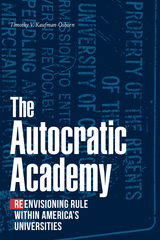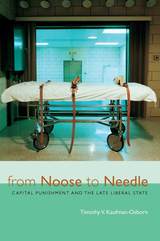2 books by Kaufman-Osborn, Timothy V.

The Autocratic Academy
Reenvisioning Rule within America's Universities
Timothy V. Kaufman-Osborn
Duke University Press, 2023
Critics of contemporary US higher education often point to the academy’s “corporatization” as one of its defining maladies. However, in The Autocratic Academy Timothy V. Kaufman-Osborn argues that American colleges and universities have always been organized as corporations in which the power to rule is legally vested in and monopolized by antidemocratic governing boards. This institutional form, Kaufman-Osborn contends, is antithetical to the free inquiry that defines the purpose of higher education. Tracing the history of the American academy from the founding of Harvard (1636), through the Supreme Court’s Dartmouth v. Woodward ruling (1819), and into the twenty-first century, Kaufman-Osborn shows how the university’s autocratic legal constitution is now yoked to its representation on the model of private property. Explaining why appeals to the cause of shared governance cannot succeed in wresting power from the academy’s autocrats, Kaufman-Osborn argues that American universities must now be reincorporated in accordance with the principles of democratic republicanism. Only then can the academy’s members hold accountable those chosen to govern and collectively determine the disposition of higher education’s unique public goods.
[more]

From Noose to Needle
Capital Punishment and the Late Liberal State
Timothy V. Kaufman-Osborn
University of Michigan Press, 2002
From Noose to Needle contributes a new perspective on the controversial topic of capital punishment by asking how the conduct of state killing reveals broader contradictions in the contemporary liberal state, especially, but not exclusively, in the United States. Moving beyond more familiar legal and sociological approaches to this matter, Timothy V. Kaufman-Osborn asks several questions. Why do executions no longer take the form of public spectacles? Why are certain methods of execution considered barbaric? Why must the liberal state strictly segregate the imposition of a death sentence, whether by judge or jury, from its actual infliction, whether by a state official or an ordinary citizen? Why are women so infrequently sentenced to death and executed? How does the state seek to hide the suffering inflicted by capital punishment through its endorsement of a bio-medical conception of pain? How does the nearly-universal shift to lethal injection pose problems for the late liberal state by confusing its punitive and welfare responsibilities?
Drawing on a wide range of theoretical sources, including John Locke, Max Weber, Nicos Poulantzas, Friedrich Nietzsche, J. L. Austin, Michel Foucault, Judith Butler, Pierre Bourdieu, Elaine Scarry, and others, Kaufman-Osborn grounds his appropriation of these authors in analyses of specific recent executions, including that of Wesley Allan Dodd and Charles Campbell in Washington, Karla Faye Tucker in Texas, and Allen Lee Davis in Florida.
From Noose to Needle will be of interest to students of law, political theory, and sociology as well as more general readers interested in the troublesome issue of capital punishment.
Timothy V. Kaufman-Osborn is Baker Ferguson Professor of Politics and Leadership, Whitman College.
[more]
READERS
Browse our collection.
PUBLISHERS
See BiblioVault's publisher services.
STUDENT SERVICES
Files for college accessibility offices.
UChicago Accessibility Resources
home | accessibility | search | about | contact us
BiblioVault ® 2001 - 2024
The University of Chicago Press









